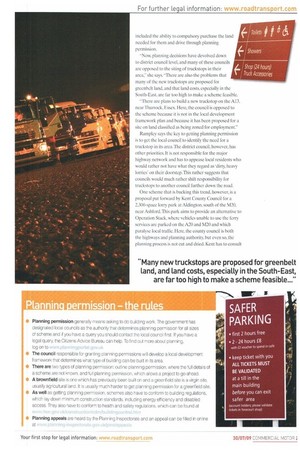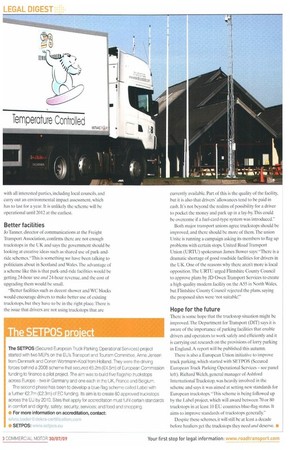Getting permission for new truckstops is more difficult since decision-making
Page 28

Page 29

Page 30

If you've noticed an error in this article please click here to report it so we can fix it.
shifted from the Highways Agency to local. councils. Is NIMBYism stopping drivers getting a good night's rest?
One issue has united the industry — truckstops. Or to be more specific, the lack of them. Also, there is the problem that some of the existing ones are situated in the wrong place, and many of those that are up and running lack the facilities a modern haulage industry needs.
The need for safe, secure parking has probably never been greater because lorry theft and attacks on drivers are increasing. Drivers also need to be able to get something to eat and drink, and have proper washing facilities when they stop.
Several attempts have been made to develop new sites, but these have come up against a seemingly impenetrable wall of problems, including a sense of N1MBYism (not in my back yard') from local planning departments.
Who is responsible?
Chrys Rampley, securities manager at the Road Haulage Association, says the situation changed in the early 1990s when the Highways Agency, which is responsible for the motorway and trunk road network, relinquished its responsibility for the development of truckstops. This included the ability to compulsory purchase the lam needed for them and drive through planning permission.
"Now, planning decisions have devolved down to district council level, and many of these councils are opposed to the siting of truckstops in their area," she says. "There are also the problems that many of the new truckstops are proposed for greenbelt land, and that land costs, especially in the South-East. are far too high to make a scheme feasible,
-There are plans to build a new truckstop on the A13, near Thurrock, Essex. Here, the council is opposed to the scheme because it is not in the local development framework plan and because it has been proposed for a site on land classified as being zoned for employment."
Rampley says the key to getting planning permission is to get the local council to identify the need for a truckstop in its area. The district council, however, has other priorities. It is not responsible for the major highway network and has to appease local residents who would rather not have what they regard as 'dirty, heavy lorries' on their doorstep. This rather suggests that councils would much rather shift responsibility for truckstops to another council further down the road.
One scheme that is bucking this trend, however, is a proposal put forward by Kent County Council for a 2,300-space lorry park at Aldington, south of the M20, near Ashford. This park aims to provide an alternative to Operation Stack, where vehicles unable to use the ferry services are parked on the A20 and M20 and which paralyse local traffic, I fere. the county council is both the highways and planning authority, but even so, the planning process is not cut and dried. Kent has to consult with all interested parties, including local councils, and carry out an environmental impact assessment, which has to last for a year. It is unlikely the scheme will be operational until 2012 at the earliest.
Better facilities
Jo Tanner, director of communications at the Freight Transport Association, confirms there are not enough truckstops in the UK and says the government should he looking at creative ideas such as shared use of park-andride schemes. "This is something we have been talking to politicians about in Scotland and Wales. The advantage of a scheme like this is that park-and-ride facilities would be getting 24-hour use and 24-hour revenue, and the cost of upgrading them would be small.
"Better facilities such as decent shower and WC blocks would encourage drivers to make better use of existing truckstops, but they have to be in the right place. rhere is the issue that drivers are not using truckstops that are currently available. Part of this is the quality of the facility, but it is also that drivers' allowances tend to be paid in cash. It's not beyond the realms of possibility for a driver to pocket the money and park up in a lay-by .This could be overcome if a fuel-card-type system was introduced."
Both major transport unions agree truckstops should be improved, and there should be more of them. The union Unite is running a campaign asking its members to flag up problems with certain stops. United Road Transport Union (URTU) spokesman James Bower says: "There is a dramatic shortage of good roadside facilities for drivers in the UK. One of the reasons why there aren't more is local opposition, The URTU urged Flintshire County Council to approve plans by JD Owen Transport Services to create a high-quality modern facility on the A55 in North Wales, but Flintshire County Council rejected the plans, saying the proposed sites were 'not suitable:"
Hope for the future
There is some hope that the truckstop situation might be improvet:1.The Department for Transport (MT) says it is aware of the importance of parking facilities that enable drivers and operators to work safely and efficiently and it is carrying out research on the provisions of lorry parking in England. A report will be published this autumn.
There is also a European Union initiative to improve truck parking, which started with SETPOS (Secured European Truck Parking Operational Services — see panel left). Richard Welch, general manager of Ashford International Truckstop. was heavily involved in the scheme and says it was aimed at setting new standards for European truckstops. "This scheme is being followed up by the Label project, which will award between 70 or 80 truckstops in at least 10 EU countries blue-flag status. It aims to improve standards of truckstops generally."
Despite these schemes, it will still be at least a decade before hauliers get the truckstops they need and deserve.












































































































































